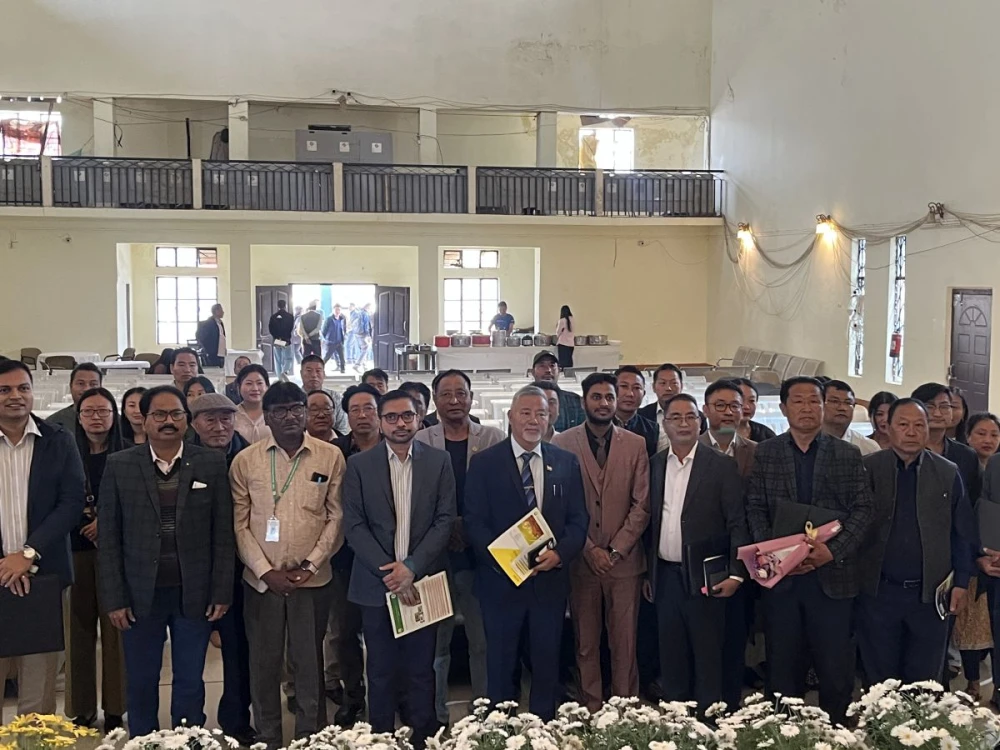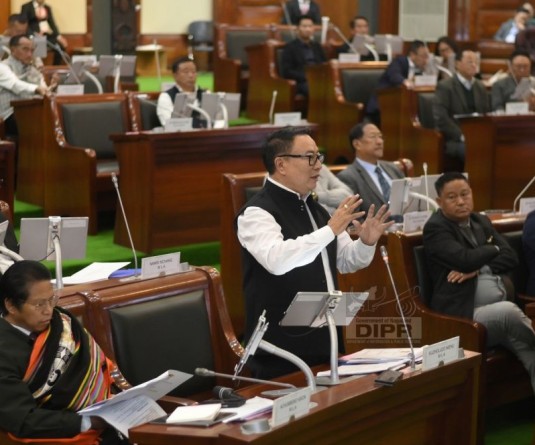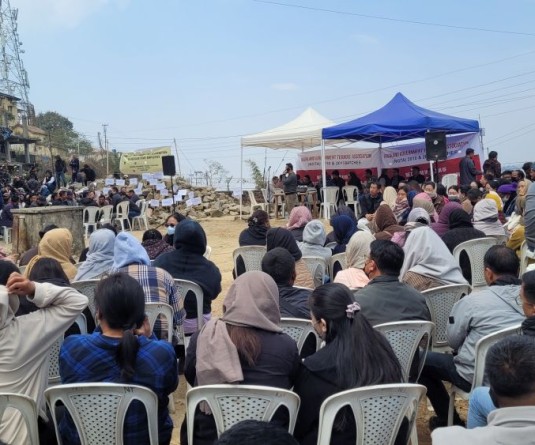
Morung Express News
Wokha | March 11
A National Stakeholders Workshop on ‘strengthening the banana ecosystem for sustainable development’ was held at the Tiyi Hall, Wokha Town on March 11. The event was organised by ICAR-Krishi Vigyan Kendra (KVK), Wokha, in collaboration with ICAR-Agriculture Technology Application Research Institute (ATARI), Umiam, Meghalaya, the District Administration of Wokha, the Government of Nagaland, ICAR-National Research Centre for Banana, Tiruchirappalli, Tamil Nadu and Nagaland State Rural Livelihood Mission, Wokha.
The inaugural session was graced by Dr Chumben Murry, Advisor to the Chief Minister of Nagaland. In his address, Dr Murry commended the KVK for their efforts in promoting agricultural productivity and highlighted the significance of strengthening the banana ecosystem, which he deemed a promising start for sustainable agricultural development.
He shared a personal anecdote from his tenure as Minister for Agriculture, reflecting on the progress and challenges faced by the agricultural sector in Nagaland. He noted that in the early 1960s, the State's agricultural production was relatively low, at around 650–700 metric tons per head. By the time he assumed office, the production had risen to 2,500 metric tons per head, though it still lagged behind other states.
He further discussed the detrimental impact of traditional jhum cultivation on the environment and stressed the importance of transitioning to more sustainable farming practices. He expressed optimism about the One District, One Product (ODOP) initiative, particularly in promoting banana cultivation as a cash crop. However, he also emphasised the need for a multi-cropping system to ensure the resilience and sustainability of farming.
He concluded by commending the focus on banana as a key crop for Wokha District, noting its potential for both local consumption and export. He touched upon the suitability of the district's subtropical climate for banana cultivation and encouraged further scientific research and input to enhance production and quality.
Five year vision document for banana production in Wokha
Vineet Kumar, IAS, Deputy Commissioner, Wokha, in his address said that the workshop aimed to promote the sustainable production of bananas and increase farmers' income. Wokha district had chosen to focus on banana cultivation after extensive discussions with various stakeholders, he said. Wokha is one of the largest producers of bananas in Nagaland, with an annual production of approximately 11,000 metric tons.
He explained that banana cultivation is widely spread across the district, making it an ideal crop for promotion. Additionally, banana cultivation is not labour-intensive, and all parts of the banana plant can be utilised, providing significant economic value.
He mentioned that the district administration is in the process of preparing a five year vision document for banana production, with the aim of creating a roadmap for the next five years. The workshop would gather technical inputs from experts and stakeholders to refine this vision.
Additionally, he also stressed the importance of national-level collaboration and scientific input for the sustainable development of banana farming in Wokha. He noted that experts from the National Research Centre for Banana (NCRB) would visit the fields to assess the situation and provide guidance. He emphasised that, while the project may face challenges, the objective is to create value for the farmers and enhance banana production in the district.
‘Explore possibility of GI for Wokha bananas’
Suman Sivachar, IFS, Divisional Forest Officer (DFO), Wokha in the special remarks stated that this was the first of its kind in the district, and acknowledged the potential for the entire State to benefit from banana production.
He pointed out that banana chips, a popular product, are typically associated with Kerala, but with Wokha's unique varieties, there is an opportunity to create a distinct identity for banana products from the region. He also highlighted the diverse banana varieties in Wokha, some of which are unique to the region.
He urged researchers to document and to preserve these varieties, as they could be valuable in terms of biodiversity. He also suggested exploring the possibility of a geographical indication (GI) for Wokha bananas, which would add value to the crop and increase its popularity.
Furthermore, Sivachar addressed the issue of market linkages, emphasising the importance of creating efficient distribution channels for banana products. He urged farmer producer organisations to utilise available resources to improve the distribution and marketing of their products. Additionally, he pointed out that banana fibre could be used to create eco-friendly products, and the district administration was already exploring opportunities for skill development in this area.

He also raised the issue of human-elephant conflict, noting that Wokha has a significant elephant population. He suggested that the banana cultivation project be implemented in a way that avoids areas with high elephant presence to minimise conflicts. He also recommended mixed cropping as a strategy to deter elephants from damaging crops. Sivachar called for the consideration of crop insurance schemes for farmers to mitigate the risks associated with farming in areas with wildlife conflicts.
Dr Homeswar Kalita, Head of ICAR Research Complex for NEH Region, Nagaland Centre in his address outlined the importance of integrating scientific research with field-level practices and ensuring that banana cultivation not only meets local needs but also contributes to the broader economy.
He acknowledged the dynamic involvement of stakeholders and emphasised the need for effective market strategies to support the banana sector. He highlighted the vast potential for producing diverse banana-based products, noting that innovation in processing and packaging is key to increasing market appeal.
S Senka Jamir, Joint Director, Directorate of Horticulture, Kohima, addressed the gathering, noting the suitability of Wokha District for various crops, including bananas. He pointed out that Wokha is well known for its high-quality products such as Assam Mandarian oranges and bananas, with several initiatives already in place to promote banana cultivation in villages like Meriyan and Wokha. He praised the district's rich biodiversity, which includes unique banana varieties that are native to the region.
Earlier, the keynote address was virtually given by Dr R Selvarajan, Director, ICAR-National Research Centre for Banana (NRCB), Tamil Nadu, and presidential address, delivered virtually by Dr AK Mohanty, Director, ICAR-ATARI Zone-VI, Umiam. Dr Sandeep Deshmukh, Senior Scientist & Head, ICAR-KVK, Wokha gave the welcome address. The workshop concluded with closing remarks by Anuranjan Singh, Project Manager of ETF.
The technical session of the workshop saw discussion on “Advances in Production, Processing, and Value Addition of Banana for the Nagaland Ecosystem,” presented by Dr KN Shiva, Principal Scientist and Principal Investigator of ABI, ICAR-NRCB, Tiruchirappalli. A presentation on “Market Opportunities for Banana” was delivered by Thejasevi Putsure, Marketing Strategist at NERACE, NEDRi.






